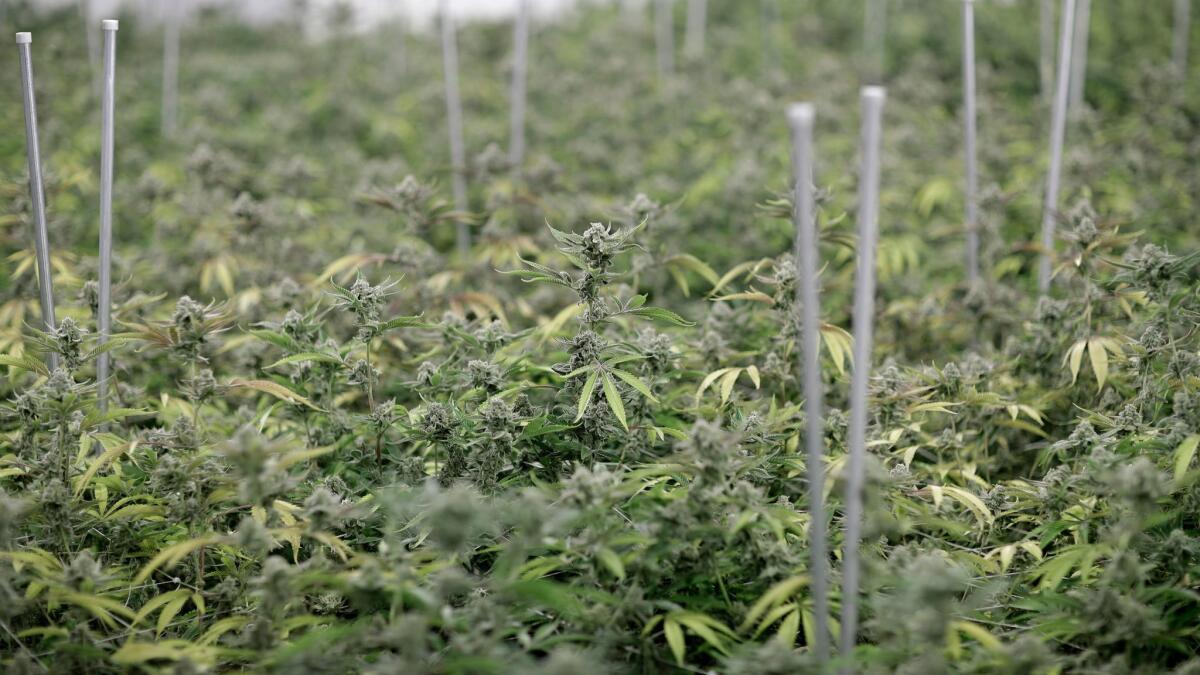Op-Ed: Weed, weed, everywhere, but not a spliff to smoke

Nearly 43 million tourists visit Las Vegas every year, and they’re all looking to experience freedoms they don’t get back home. For some people, that means outdoing the most clichéd Hollywood version of Sin City excess. But even a staid conventioneer can find excitement here — like, say, a ludicrously expensive steak at one of the many fancy restaurants.
On July 1, when recreational marijuana goes on sale in Nevada, one more thrill will be on offer.
Fremont Street gift shops already are profiting. Shelves of green ceramic ashtrays with the phrase “High from Las Vegas” now compete with the usual gambling-themed tchotchkes.
Visitors should have no problem purchasing marijuana at dispensaries near the Strip. But where will they consume it? Nevada allows for consumption only in private residences with the owner’s permission. Even if you could make the dubious argument that your hotel room is a “residence,” guess who won’t give their permission? Casino owners.
Tourists surely will protect Nevada’s free-spirited values by breaking the rules.
As of now, that means tourists can put their new pot-leaf shaped ashtrays to use exactly nowhere on the Strip. According to the Las Vegas Sun, “Smoking outside dispensaries, at casinos or even in a parked car could result in a $600 fine.” The Nevada Gaming Commission has come out strong against marijuana. And a bill to create consumption lounges went nowhere. Or, put more cutely, it went up in smoke.
Cynical locals suspect that casinos want to ban marijuana because it doesn’t create the right kind of high. Alcohol produces a devil-may-care insouciance that’s conducive to gambling. Marijuana, on the other hand, will only help the bottom line of all-you-can-eat buffets. A paranoid stoner won’t dare to gamble — he’ll think the face cards are watching him.
While there might be some truth to the theory that casinos are reluctant to embrace a drug that causes giggles and sedation, the industry has a bigger reason to steer clear. Even though the American public views marijuana as (more or less) benign, the feds still classify it as a Schedule I drug. As long as it’s in any way illegal, casinos won’t hazard the ire of Big Brother. There’s too much money in the long-established vices — gaming, alcohol and tobacco — to risk everything on upstart entertainment.
The grand resort chains don’t want to risk losing their gaming licenses. That would destroy this town. And if that sounds like hypocrisy from an industry that encourages risk-taking, just remember that it’s the gamblers, not the house, who take on all the risk. (It’s perfectly true that the house always wins.)
But the Vegas mythology has always been about personal freedom, and my guess is that the casinos eventually will fall in line (even if only after the feds indicate they’ll turn a blind eye).
This isn’t the first time our state has defied federal prohibition. In 1923, Nevada repealed its alcohol ban, and Las Vegas saloons openly served booze. Every so often, feds would come up from Los Angeles to roust the lawbreakers, but that wasn’t much of a deterrent.
And so long as casino owners won’t, tourists surely will protect Nevada’s free-spirited values by breaking the rules. Many will get away with it. A suspicious skunky smell already wafts through Strip parking garages. Discrete and odorless edibles likely will be the most ubiquitous, followed by nearly odorless vape pens. Joints will pass anonymously through concert crowds, as they always have.
For visitors from Colorado and Washington — and let’s face it, California, even though full legalization won’t come into effect until January — the Strip’s continued prohibition might enhance the thrill-seeking experience. They’ll come to Vegas to remember how fun it was to smoke pot when it was still illicit.
C. Moon Reed is a staff writer for the Las Vegas Weekly. Follow her on Twitter @cmoonreed and on Facebook.com/cmoonreed.
Follow the Opinion section on Twitter @latimesopinion or Facebook
More to Read
A cure for the common opinion
Get thought-provoking perspectives with our weekly newsletter.
You may occasionally receive promotional content from the Los Angeles Times.










